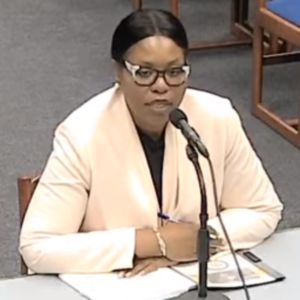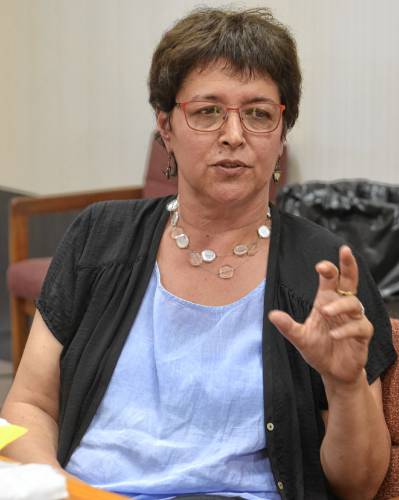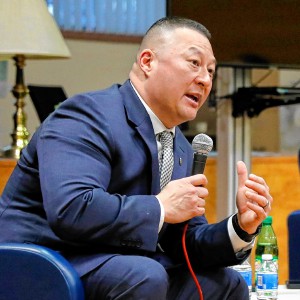New federal mandate requires informed consent for sensitive exams
| Published: 04-18-2024 1:30 PM |
BOSTON — Massachusetts teaching hospitals and medical institutions must obtain written informed consent before any sensitive and intimate examination, including breast, rectal, prostate, and pelvic exams, as a result of a federal decision effective April 1.
The change went into effect as a bill filed by Sen. Jo Comerford, D-Northampton, and Rep. Mindy Domb, D-Amherst, awaits action in the Legislature’s Health Care Financing Committee. The legislation would prohibit non-consensual pelvic exams on women under sedation. The lawmakers have filed similar bills since 2019.
“This decision is really important,” Comerford said. “I believe students have the right to learn on live patients, and those live patients should give their consents.”
Comerford said their proposed legislation has been legally ratified by the federal government, underscoring the need for a standard requirement for patient consent, and reflecting a shift toward strengthening patients’ rights.
The U.S. Department of Health and Human Services said the guidance was issued to “reiterate and provide clarity” regarding hospital consent requirements. Federal regulations previously mentioned obtaining consent for “important tasks” related to surgeries, and did not provide the level of detail about medical students.
If hospitals don’t obtain explicit consent, they may be ineligible for participation in Medicare and Medicaid programs, and also may be subject to fines and investigations if they violate patient privacy laws, Office of Civil Rights director Melanie Fontes Rainer said.
At least 20 states have passed laws requiring such patient consent.
Rainer said both patients and the medical students will benefit from the new requirement. Patients will be aware of the procedures they will undergo, which is particularly important for those who will be put under anesthesia. At the same time, written permission will allow medical students to perform exams on unconscious patients.
Article continues after...
Yesterday's Most Read Articles
 Pro-Palestinian protesters set up encampment at UMass flagship, joining growing national movement
Pro-Palestinian protesters set up encampment at UMass flagship, joining growing national movement
 Island superintendent picked to lead Amherst-Pelham region schools
Island superintendent picked to lead Amherst-Pelham region schools
 Sole over-budget bid could doom Jones Library expansion project
Sole over-budget bid could doom Jones Library expansion project
 State fines Southampton’s ex-water chief for accepting lodging and meals at ski resort, golf outing from vendor
State fines Southampton’s ex-water chief for accepting lodging and meals at ski resort, golf outing from vendor
 Authorities ID victim in Greenfield slaying
Authorities ID victim in Greenfield slaying
 2024 Gazette Boys Basketball Player of the Year: Marcielo Aquino, Amherst
2024 Gazette Boys Basketball Player of the Year: Marcielo Aquino, Amherst
The Centers for Medicare & Medicaid Services has updated the specific regulations for informed consent in hospitals and other health care facilities that participate in Medicare and Medicaid. These regulations ensure that patients or their legal representatives are fully informed about the care and treatment they will receive. The U.S. Department of Health and Human Services also includes provisions that ensure that patients have access to their medical records and information about their treatment.
However, medical facilities may overlook this instruction, and there are instances in which the consent signature stage is ignored, according to Domb.
For instance, during a procedure, a surgeon may need to undertake further treatment that was not initially planned or approved if they find an unforeseen problem that needs to be addressed immediately. Domb said the rule is intended to serve as a teaching tool for medical students, emphasizing the need for consent from unconscious patients.
“Because it can happen as part of the teaching, especially patients who are in the anesthesia,” she said. “Once the surgery starts, the patients would not be able to say, ‘Excuse me, what are you doing?’ or ‘I’d like you to stop, and I don’t want it to happen’ because they are incapable of communicating, so our responsibility is to ensure that patients are secure and at ease during the process.”
Domb said she and Comerford would collaborate with the Massachusetts Department of Public Health to see if they could help them more successfully implement the new guidelines, because medical school regulations are often poorly documented.
The goal is to guarantee that every patient, regardless of context, has the opportunity to declare “I give you consent to,” Domb said, whether or not that surgery is performed. They hope to expand the regulations application to all hospitals in the United States, not just medical schools.
“It’s a great step for the federal government to take this initiative to protect patients’ autonomy and students’ freedom to be put in awkward positions, because this should not be their responsibility if no one tells them,” said Domb.
“It will be interesting to see what hospitals do on their own as a result of this guidance, and we will work on maximizing its impact and effectiveness,” she said.
Xinyi Yank writes for the Gazette from the Boston University Statehouse Program. Reporting by Devna Bose of the Associated Press was used in this report.



 Area property deed transfers, May 2
Area property deed transfers, May 2 Pro-Palestinian encampment disperses at UMass, but protests continue
Pro-Palestinian encampment disperses at UMass, but protests continue Amherst council confirms Gabriel Ting as police chief
Amherst council confirms Gabriel Ting as police chief Music key to Northampton’s downtown revival: State’s top economic development leader tours city
Music key to Northampton’s downtown revival: State’s top economic development leader tours city 
